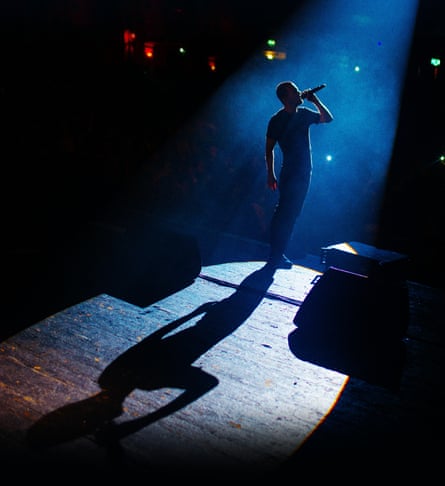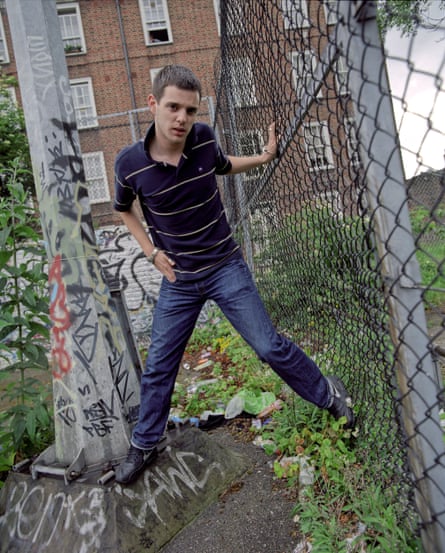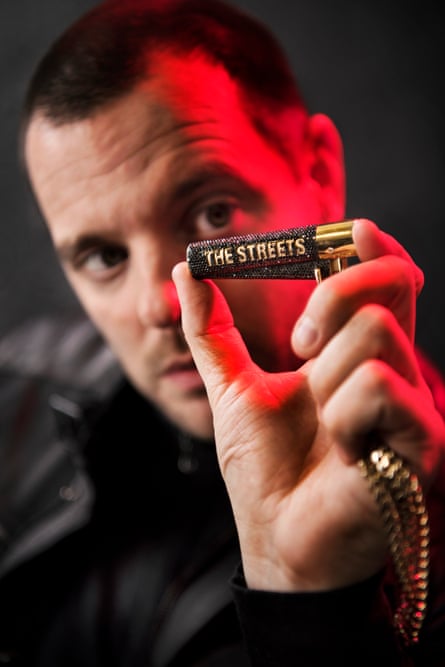If It So Easy Then Why Dont You Do
'T his is where I go on like Morrissey and say something terrible," says Mike Skinner. "That's what ageing musicians are supposed to do, isn't it? They go: 'The thing is, right …'" He grins mischievously: "Just don't make me look like Eric Clapton, OK?"
The musician best known as the Streets has come prepared for what he has – cheekily – assumed will be a takedown interview. "I don't know whether I need to be cancelled or not. Was Fit But You Know It sexist?" he says, referring to his 2004 single that contained the lyric: "See, I reckon you're about an eight or a nine / Maybe even nine-and-a-half in four beers' time." Well, it doesn't look too great under a 2020 microscope, I admit. But then, as Skinner points out: "It's definitely better than [the Prodigy's] Smack My Bitch Up!"
Skinner doesn't need to worry about being out of touch, though. He may be settling into middle age at 41, but he's about to release None of Us Are Getting Out of This Life Alive, a mixtape full of guest spots from young stars. And while in his 00s heyday the Streets could be lairy and laddy – Skinner made his name rapping about beers, birds and bad takeaways – there was always far more going on with his lyrics. Turn the Page, the opening track of the Streets' 2002 debut Original Pirate Material, referenced the Roman empire, Jimi Hendrix, the Bible, knife crime and Birmingham's Bullring – and it was only three minutes long.

Born in London, but raised in Birmingham, Skinner's talent was to take UK garage and make it more relatable to people like him: rather than champagne and velvet VIP ropes, he was conjuring verses about Vauxhall Novas and scrambled eggs. Crucially, he found a way to rap about male fragility in a way that appealed directly to men: revealing their cluelessness around the opposite sex (Don't Mug Yourself), fascination with, and fear of, violence (Geezers Need Excitement) and ultimate self-centredness (It's Too Late). His biggest hit, Dry Your Eyes, was a heartfelt exploration of how it feels to be dumped. Yet rather than seeing it as a defining song that ripped up the rulebook and made it OK for young men to openly talk about their feelings, Skinner maintains it was just a clumsy attempt to impress women. "When you're a young artist and a boy, you think: 'Now I'm gonna write one for the girls.' And, of course, the girls will never like it. Because you think: 'Well, girls like something they can sing along to' and 'Girls like romance' ... but actually, they kind of like basslines."
Skinner's intelligence has sometimes seemed as much of a burden to him as a gift. In the past he has cut a complex, self-critical and frequently frustrated figure. Skinner wound up the Streets in 2011, admitting he was exhausted with the whole thing. He struggled for subject matter – "You gradually make your life easier and easier until you've got nothing left to say" – and success didn't agree with him. At times he could be petulant – he remembers one show where he got drunk and started mocking the lyrics to It's Too Late. "My A&R man had to say: 'Stop taking the piss, people have paid to hear something, an emotion.' The thing is, artists want to move on quickly to the next thing. But it takes fans a long time to get to know and like a song, for it to become a part of their life. If you're not allowing them to do that you're really just wasting your time putting all that effort into the art."
Looking back on that first album is a strange experience for Skinner because it came so naturally. "People say: 'Oh, they're only 19 or 20 and they've made this amazing music,'" he says. "But it's like ... actually, that's when it's easiest. You've come straight out of the school playground and you're like: 'That's shit, that's good, this is what I believe in, go.'"
Original Pirate Material made Skinner famous, but it was the Street's follow up, 2004's A Grand Don't Come for Free, that sent his fame stratospheric, and his mind into a spin. "I don't generally have a lot of sympathy for celebrities," he says, "because you can always not walk into the fire. But if you do, then you are absolutely taking a gamble with your mental health. And it's a traumatic thing, to be very young and very famous. Not like some traumas, but it's … I guess it's a bit like winning the lottery. It doesn't usually end well."
Skinner once told an interviewer: "I have to be creative or I get suicidal or something." Records that grappled with his fame, such as Prangin' Out, from the Streets' third album, The Hardest Way to Make an Easy Living, contained lyrics about doing "something stupid". Was that really how bad things got?
"I only ever got as far as thinking about it," he says. "And thinking about it is a reason to go to a psychiatrist."
Did he?
"Yeah. I actually saw my psychiatrist just last week. We spent the whole time talking about skiing." He laughs: "I think basically the rule is, if you end up talking about the psychiatrist, you're probably good."

Around the time Skinner's career was really taking off, he lost his father (grief inspired the beautiful Never Went to Church) after a long illness, which didn't help his emotional struggles. Skinner was the youngest of four siblings, and credits his dad for the wisdom he passed on: "My dad was a lot older – he grew up in the second world war, he literally was in the blitz. He used to listen to Glen Miller ... war joints, know what I mean? But he was incredibly open-minded."
He remembers being dumped as a 14-year-old and his dad explaining how things would get easier, but that he would soon have to work out how to look out for women, too. "He made me see how strange it must be for a girl to go from being a child to suddenly forced on to the market. Only someone who has had a previous marriage, children, literally at the end of their life, could teach little things like that."
Since he first ended the Streets, Skinner's career has been hard to untangle. There have been various under-the-radar projects such as rock outfit the Dot with the Music's Rob Harvey, or his slightly rambling Peak Times podcast series with Murkage Dave, the soulful singer with whom he also put on successful, balloon-filled hip-hop and grime Tonga club nights (sample discussion topics: Müller Rice vs Müller Corner; what if Hitler had Twitter?). In 2017, Skinner brought the Streets back from retirement for a greatest hits tour and a series of collaborative efforts such as the drum'n'bass club track Take Me As I Am with Chris Lorenzo. Again, it all seemed pretty scattershot, which is how Skinner enjoys working – he likens making his new mixtape to "directing chaos".
Chatting to Skinner can be a bit like directing chaos, too. He is fascinating company, but ask a question about one of his songs, for instance, and you're only ever one step removed from a tangential discussion about the Cambrian explosion ("Was there really enough time for all these dinosaurs to evolve?") or the way our eyeballs age ("Having watched the Irishman, even the middle-aged Robert de Niro's still got old man eyes. They're more reflective or something.")
"You wonder if we're all part of a magic mushroom experience," he says at one point. "Or maybe we're living in a simulation. They do say 50% of all science will be disproved ... so really it's a flip of the coin whether anything is true or not." You sometimes wish you were down the pub with him, free to follow him down his endless rabbit holes, rather than marshalling an interview.
Right now, he appears to have found a project he can finally focus on: a Streets film that he has been working on for "donkey's years", but which he hopes will finally start shooting this year. "It's a Streets musical, really," he says, shortly before telling me that it's not really a Streets musical at all, although it does feature a soundtrack of Streets music that he wrote about three years ago. "I love Raymond Chandler and so with the film, it's this idea of a DJ as a sort of cynical or disillusioned private detective," he says. "Basically, imagine if Philip Marlowe was a bass DJ, featuring music from the Streets."
Scriptwriting isn't a new thing for Skinner. A Grand Don't Come for Free was an ambitious rap opera that wrapped a tale of romance and remorse around the disappearance of £1,000 belonging to the protagonist. To write it, he attended a workshop with the Hollywood screenwriting guru Robert McKee, who taught the likes of Kirk Douglas, Paul Haggis, Joan Rivers and even David Bowie.
That album clearly influenced his film project, but perhaps not as much as his DJing experience. "I'd spent years and years working on scripts, wondering what I could write about," he says. "Then one night I was in Manchester, a security guy had just beaten someone up, and I suddenly realised: it's very easy to find stories in nightclubs. It's the middle of the night, people are literally trying to be their worst selves ... even the promoters are! No one's there to behave."
Does he still engage in night-time hedonism himself? "It's difficult," he says. "With touring, you control everything, so it's very easy to do whatever you want. If you want to take smack, play with animals and paint the dressing room every night then that's fine – you just need to cut a cheque. It's also very easy to not do that, and find a routine where it's carrot juice and turmeric lattes every night rather than straight-up madness. But with DJing, it's not your world you're walking into, it's whatever that promoter and that town have created. So you're hoping it doesn't go left because it's not cool to be 40, in a nightclub, getting off your face. But it happens."
Still, Skinner says he's a lot more grownup than he used to be. He has to be, with two kids to look after (Amelia, 10, and George, 8), which must be difficult to balance with the wild nights.
"Well I'm definitely going to get Alzheimer's," he laughs. "It's not good for your sleep. But having kids does kind of focus your creativity."
Skinner hasn't stopped championing underground artists. In 2017, his excellent Don't Call It Road Rap documentary for Vice was released, which explored the explosion of the UK rap scene. Filming it, he says he was struck – and slightly embarrassed – by the fact he could be in one of the rougher ends of Kilburn, north London, talking to young musicians about "prison, illegitimate business, all kinds of goonish stuff", and then take an Uber a few minutes down the road to mix in music and fashion circles with his wife, Claire Le Marquand, whom he met when she worked at Warner Brothers, his record label, and married in 2010.

"I think I struggled with that for a bit," he says. "But you realise that, actually, you can have an incredible sense of purpose that goes with that. Because I've got so many incredible stories of people changing their lives with rap. And it's a nice thing to see. Because nobody wants a life of crime. It's very hard work. It's much easier to be a musician than a drug dealer."
He says he's currently trying to see things from other people's perspectives – be that rightwing financiers, petty criminals or the older generation. "As the so-called metropolitan elite, and I include myself here, I think we owe it to them. Because everybody believes they're the hero in their own story." Reflecting on the current generational divide, he says: "When you're young you think old people are a bit stupid. But they've done everything we've done, plus everything the previous generations did, and the one before that. I think old people almost become Buddhists. They're like: 'It ain't worth me saying shit so I'm going to just sit here and chill.'"
You can imagine Skinner as an old man imparting his wisdom – it's basically what he has been doing through the course of five albums and however many other projects, an old head on young shoulders. Back in 2011, when Skinner was exhausted with the Streets, he tried to sum up his career thus far: "For the Streets … overall … I'd say it was a seven out of 10."
It seemed rather harsh considering his impact on British culture. Today, Skinner appears far less jaded and so, before he leaves, I wonder if he has a rosier assessment of his past work.
"I mean ... I still think that's fair," he says, ever the self-critic. "But I suppose my best songs have got to be a 9/10."
He reconsiders this for a second: "Then again, I wouldn't expect anyone to say that their best work wasn't a 9/10. If you don't think your best work is a nine then ... you probably need to go and see my psychiatrist."
The first single from the Streets' forthcoming mixtape will be released next month on Island Records
This article was amended on 17 March 2020 because an earlier version gave Mike Skinner's age as 42. This has been corrected to 41.
Source: https://www.theguardian.com/music/2020/mar/16/mike-skinner-its-not-cool-to-be-40-in-a-nightclub-getting-off-your-face-but-it-happens
0 Response to "If It So Easy Then Why Dont You Do"
Post a Comment